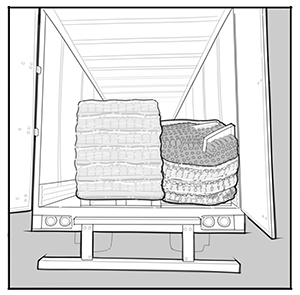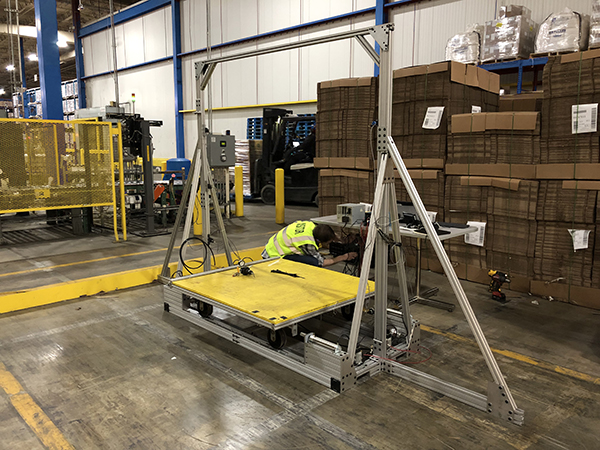In-Plant Unit Load Transportation Integrity Testing and Improvement

 It is quite possible that there has never been a more revolutionary period of change in the history of packaging. With the advent of e-commerce and a seriously strong focus on sustainability, there have never been more simultaneously competing requirements on the successful transport of goods than the present, often putting manufacturers in a catch-22 situation.
It is quite possible that there has never been a more revolutionary period of change in the history of packaging. With the advent of e-commerce and a seriously strong focus on sustainability, there have never been more simultaneously competing requirements on the successful transport of goods than the present, often putting manufacturers in a catch-22 situation.
The problem: Unit Load Collapse
One manifestation of competing requirements occurs with stretch wrapped unit load stability. Manufacturers of products like rolled paper goods, salted snacks, food, beverages, liquid laundry, and beauty care products, to name a few, are under significant pressure to deliver packaging systems with improved stability and sustainability while reducing costs, but having sufficiently adequate primary, secondary and tertiary packaging to survive distribution. As a result of many interacting variables, many companies are encountering an increased frequency of product rejection as a result of unit load collapse in distribution. At an alarming rate, trailer loads of products are being rejected because of leaning, collapse, or damaged unit loads.
The action: Integrity Testing
The remediation fire drill usually begins with numerous time consuming and expensive ship tests where stretch wrap materials and stretch wrapper settings are varied. This approach, however, usually generates ambiguous results with little or no quantitative data to provide confidence that a solution has been identified. Also, because of the time and expense, the number of material and process variables that are included in the testing is very limited.
The solution: PalletSled™
After many years of working in the field of physics-based analysis and testing of unit load-based packaging systems, our engineers developed a portable unit load test system known as PalletSled™. The PalletSled system can be used directly at the clients’ site, in very close proximity to the stretch wrapper, to quantitatively evaluate and rank the performance of possible stretch wrap and palletizer solutions in real time without interfering with the plant production.
Some of the integrity tests that can be performed on site with PalletSled include:
- Stretch wrap tension variation
- Wrap pattern
- Number of wraps
- Case stack patterns
- Stretch wrap film material properties
- Stretch wrap gage (thickness)
- Unit load overhang and under-hang
- Palletizer stacking variations (case gaps, layer compression load, unit load center-ness, layer-to-lay off-set, etc.)

PalletSled makes it possible to perform designed experiments (DOE) to identify the best possible solution for a given set of unit load variables and constraints at the only location where a valid test can be performed – adjacent to your packing line.
If your organization is struggling to manage product optimization efforts and experiencing problems with unit load stability, you can learn more about the technical resources needed to implement these projects successfully by visiting our website.

Jay Yuan, PhD, PE – Principal, Cincinnati Office
Jay Yuan, PhD, PE has been working in the packaging industry in the United States for 23 years. His expertise ranges from flexibles to rigid, and carton, corrugates, plastics to metal packages. He holds two patents for major brand name package designs currently on the market. The recent 28 oz Gatorade package co-development work with PepsiCo won the 2014 DuPont Packaging Award for the most responsible packaging. He received an M.S. in Solid Mechanics from Peking University and obtained his PhD. at the University of Akron. Dr. Yuan is a registered professional engineer and member of IoPP, ASME, SPE and TAPPI. He is a strong activist for in-silico transit testing in package development. His other work, “Simulation of Primary Package Damage in a Tray-based Unit Load,” was presented at ISTA Packaging Forum in Orlando, Florida in 2011.




Leave a Comment
You must Register or Login to post a comment.